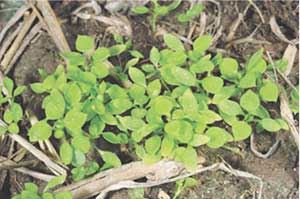|
ALS-Resistant Common Chickweed Becoming More Of An Issue In Nearby States
DR. MANDY D. BISH AND DR. KEVIN BRADLEY
COLUMBIA, MO.
Common chickweed (Stellaria media) that is resistant to Group 2, or ALS-inhibiting herbicides, is on the increase in certain areas of the U.S., and can be a considerable problem in wheat production. Prior to 2014, resistance was confirmed in Virginia, Maryland, Del-aware and Kentucky wheat fields and Pennsylvania wheat, alfalfa and barley fields. This year ALS-resistant common chickweed has also been confirmed in Tennessee and Kentucky. So far, we aren’t aware of any cases in Missouri. In many of these states, the chickweed populations are also showing resistance to more than one kind of ALS-inhibitor herbicide. Last year, due to the problematic nature of the chickweed infestations in Pennsylvania, the state approved metribuzin for use in winter wheat and winter barley under a special local needs label1.
Common chickweed is primarily a problem weed of cereal grains, alfalfa fields, pastures, and gardens; it grows prostrate and relies on neighboring plants for support. When present at densities of 30 or more plants per square meter, this weed can cause wheat yield reductions. In Missouri, wheat yields were reduced by 28 percent when common chickweed was present at densities of 169 plants or more per square meter.

Currently, Harmony Extra and many other ALS-inhibiting herbicides labeled for use in wheat such as Finesse and Osprey provide good control of common chickweed in Missouri wheat fields. If you have been using Group 2 herbicides in wheat for a number of years and are now experiencing poor chickweed control, chances are you may be seeing resistance in your chickweed population as well. Unfortunately, there are only a few other herbicide alternatives for the control of this species in wheat. Metribuzin (Dimetric, Glory, etc.) and some of the growth regulator herbicides (2,4-D, dicamba, Starane) and mixtures of these herbicides are some of the few active ingredients that provide acceptable post-emergence control of chickweed. In order to prevent ALS-resistant chickweed populations from becoming problems in Missouri wheat fields in the future, wheat growers should implement an annual rotation of herbicides with different sites of action or use tank-mixes of herbicides with different sites of action.
• For more information on common chickweed and other problematic weeds, visit our Web site: http://weedid.missouri.edu
• To learn what sites-of-action many commonly-used herbicides target, download the Take Action on Weeds Herbicide Classification chart: http://bit.ly/1sD17Rr
• To see a survey of herbicide-resistance weeds in the U.S. and world-wide: http://www.weedscience.org/summary/home.aspx . ∆
1Glory Herbicide (metribuzin) Receives Special Local Need Label for Control of ALS-Resistant Chickweed in Pennsylvania: http://bit.ly/1sCG7KD
2Wertz BA. (2014) Common chickweed. Penn State Extension: http://bit.ly/1DnfTnN
DR. MANDY D. BISH: Research Specialist, University of Missouri
DR. KEVIN BRADLEY: Associate Professor, University of Missouri
|
|